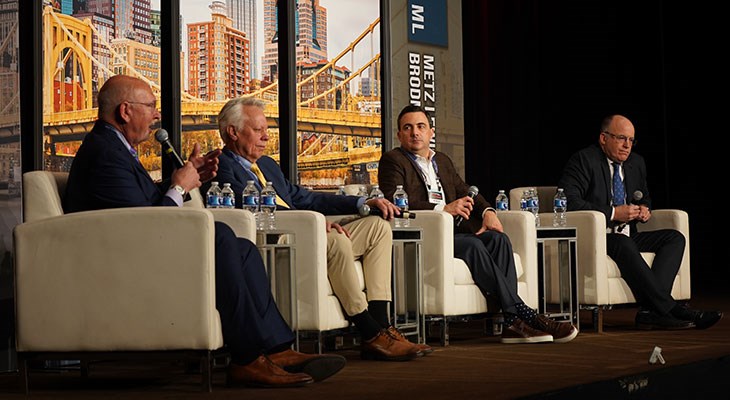John Lewis Founding Member Metz Lewis Brodman Must O'Keefe LLC, kicking off this year's Pittsburgh Smart Business Dealmakers Conference, shared a recent deal study that found 31 percent of transactions have earnouts, meaning that there is some sort of contingent purchase price that's payable after the closing.
From PNC Mezzanine Capital Managing Director Robert Codol's perspective, earnouts are an option, but it comes with considerations.
"It's complicated, though, and it creates potential risk in the future," Codol says. "But there are certain instances where it's the only way to get a deal done."
Most often an earnout is in play when there are valuation differences between buyer and seller. That oftentimes can be because something changed during the process — either the seller is experiencing more growth than they thought and want to have value attributed to that, or the opposite: the business hasn't performed as expected but the seller still wants the same purchase price.
"Those are the areas where I think they become a somewhat more relevant tool versus at the outset because, again, they set up issues down the road, and we've had those situations and they can be difficult to deal with," he says.
In Bill Delaney's recent transaction, in which he sold his family business, Distributor Service Inc., to Hood industries in 2023, he says there were earnouts on the table for him. However, it wasn't what he wanted.
"Simply put — and again, I was fortunate — that was a non-starter for me," Delaney says.
Matthews International Corp. Executive Vice President and General Counsel Brian D. Walters says he uses earnouts in deals, but he'd prefer not to use them. They can be in place because his company is involved in such diverse businesses that for any deal, they can be competing with a private equity firm that's offering a much greater multiple. An earnout in that situation can be a way to close the gap. But there is risk.
"Complicated is an understatement, usually, with the earnout," Walters says. "And it's challenging. The battleground on the earnout is generally going to be control — post-closing, who gets to control that business unit, and make sure that the seller isn't impeded from hitting the thresholds that allow them to achieve the earnout. And so, there's a lot in the in the pre-negotiation around who is controlling the business. It's complicated even more when you're a public company and you're going to do what you have to do to ensure shareholder value. There's potentially a lot of tension in there."
Still, he says he's used them, even though he doesn't like to. And when he does, he says he enters into them with a full expectation that he's going to pay it — in fact, it's his hope that he ends up paying the earnout. That's because if you have a seller who is suspicious of whether that's really the buyer's goal, it's going to be problematic.
He says in one international deal that was structured around an earnout, but the sellers never really trusted them. He says he ended up getting sideways with the sellers and ultimately paid it because there were critical relationships involved, which highlights how complicated earnouts can make a deal.




